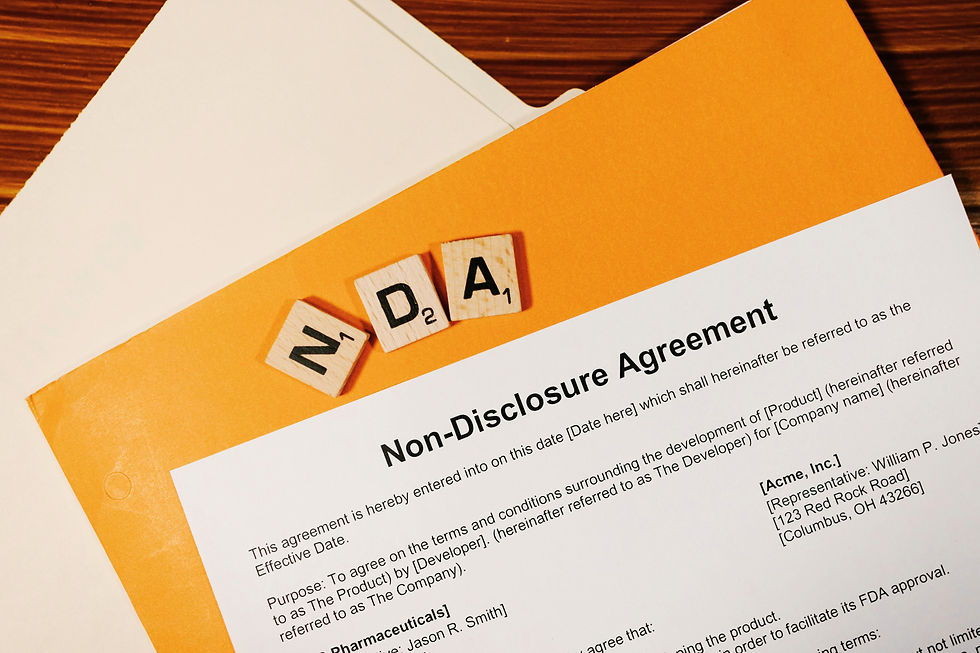The Essential Documents for a Business Sale - Beyond the Purchase Agreement and More
- Chris Johnsen

- Jul 15, 2025
- 7 min read
Updated: Aug 28, 2025

The process of selling a business requires extensive documentation that goes beyond the basic purchase agreement.
The transaction requires dozens of extra documents including resolutions and promissory notes as well as security agreements and employment contracts.
The documentation protects both buyer and seller interests while maintaining legal compliance throughout the transition process.
This article examines the essential documents which appear during business sale transactions with particular focus on employment agreements and seller financing.
The Core Documents: What Every Business Sale Needs
Any business sale depends on the purchase agreement as its fundamental document. The essential document describes all business sale conditions together with payment details and specifies the assets and equity involved in the transfer. The legal section of this document contains essential elements such as representations and warranties together with indemnification clauses and closing conditions which define how the transaction will be completed. A properly structured purchase agreement serves as a vital foundation because it protects the deal from potential legal issues and future misunderstandings.
Setting the Stage with a Letter of Intent (LOI)
The parties usually sign a Letter of Intent (LOI) before completing a purchase agreement. The document provides foundational terms that guide both the negotiation process and due diligence evaluation. An LOI contains binding provisions mainly for confidentiality and exclusivity terms although its other provisions typically remain nonbinding. The binding provisions of an LOI serve to establish trust between the buyer and seller when they exchange sensitive business information.
Protecting Sensitive Data with a Non-Disclosure Agreement (NDA)
The Non-Disclosure Agreement (NDA) represents a vital document which businesses should execute during the initial stages of their process. The negotiation and due diligence phases benefit from the protection of proprietary and confidential information through the use of this agreement. Sensitive data remains protected because this agreement stops both parties from exploiting it or sharing it with external entities. Trust protection and trade secret and client list and financial data and intellectual property disclosure require this agreement to ensure proper confidentiality.
Beyond the Core: Essential Supporting Documents
Multiple supporting documents beyond the core agreements serve to establish a complete transaction structure.
Corporate Resolutions and Meeting Minutes: Verifying Authorization
The documents that fall into this category consist of corporate resolutions together with meeting minutes. State corporate law together with company bylaws demand these documents to verify board of directors or member approval of the sale. The execution of properly drafted resolutions confirms both legal authorization and internal compliance documentation for the transaction.
Transfer Documents: Asset Sale vs. Equity Sale
The transaction type determines whether asset sale or equity sale documents need to be used for the transfer process. A bill of sale functions as a transfer document to convey ownership rights of particular assets which include inventory and machinery and real estate and intellectual property. The transfer of business entity ownership requires an assignment of interest or a stock transfer agreement in an equity sale. These documents need to specify all transferred items together with their corresponding terms.
Securing Third-Party Consents and Assignments
Third-party consents and assignments become essential documents in situations where the company maintains active contracts and leases and licenses that need explicit transfer permission. The assignment of a commercial lease needs landlord approval to proceed with transferring ownership to the new owner. The implementation of required consents before the sale date protects businesses from future legal problems which would disrupt their operations.
Financial Statements & Tax Returns: Ensuring Transparency
Sellers need to obtain complete financial statements together with tax returns as part of their sale preparation. These financial documents enable buyer transparency and help value the business while being essential for due diligence evaluation. A detailed financial record establishes trust with buyers and provides sellers with stronger bargaining power.
Navigating Seller Financing: Key Documents and Protections
Businesses that offer financing to sellers become more attractive to potential buyers who need help obtaining third-party funding. The seller receives parts of the purchase price through scheduled payments instead of receiving the full amount at the time of closing. This arrangement involves several legal documents.
Understanding Seller Financing Arrangements
The promissory note stands as the most essential document among them. This document shows how the buyer must repay the seller based on established payment terms. The document includes information about the principal sum along with interest terms and payment intervals and loan duration. The agreement contains provisions about defaults and late fees and additional safeguards that benefit the seller.
Security Agreements and Personal Guarantees: Protecting the Seller
The seller can ensure their protection through the execution of a security agreement. Through this agreement the seller obtains a security interest in business assets sold until the complete repayment of the loan. In case of default the seller retains the right to take back these assets while simultaneously pursuing legal options. The seller might request a personal guarantee from buyers who lack credit history as individuals or new entities because this condition makes them personally liable for repayment.
Ensuring Compliance with Lending Regulations
State and federal lending laws require that these financing documents receive proper drafting and review. The documents need to be customized according to the deal specifics to establish enforceability while reducing potential risks.
Employment Agreements: Managing Post-Sale Transitions
Why Employment Agreements Are Crucial in Business Sales
Employment agreements play a crucial role in business sales since they determine the fate of seller involvement and essential employee roles following the transaction. The buyer normally demands the seller to maintain leadership or advisory functions following the acquisition to maintain operational stability and protect important institutional knowledge. These agreements explain how this ongoing relationship will be structured and what conditions will apply to it.
Defining the Seller's Post-Acquisition Role
The employment agreement discussion stands as one of the key matters which defines the transaction. The buyer seeks extended seller involvement for post-sale transition support but the seller may prefer to leave the company or retire. The terms regarding payment rates together with work duties and employee advantages and time period commitments help establish mutual understanding between the parties and prevent upcoming conflicts.
Essential Elements of Employment Contracts
The essential elements within employment agreements specify job responsibilities in detailed terms so both parties understand what responsibilities lie ahead. The compensation package of the new business might consist of base salary payments alongside performance-based bonus opportunities as well as equity ownership. The agreement needs to specify all benefits along with vacation time and expense reimbursement details.
Safeguarding Interests with Non-Compete and Non-Solicitation Clauses
Most buyers in this situation will insist on having non-compete and non-solicitation clauses within the agreement. The seller cannot start a competing business or recruit former employees during a particular time period following the sale according to these provisions. These clauses exist to safeguard the buyer's investment while maintaining employee stability and protecting client relationships.
Special Considerations for SBA Loan Financing
The employment agreement subject to SBA loan financing requirements for acquisitions comes with specific regulations that need to be followed. Any agreement between the buyer and seller must have a maximum duration of 12 months and the seller must not maintain control over the business according to SBA regulations. The loan approval process will be affected if these requirements are not properly documented and considered.
The Strategic Importance of Thorough Documentation
Legal and Financial Protection: Mitigating Disputes
Both legal and financial protection of all parties depend on proper documentation beyond its formal status. Complete and clear documentation reduces the possibility of disputes following the sale and provides legal options when issues occur. The contracts function as legal proof of what was agreed and how it should be carried out.
Enhancing Buyer Attraction and Streamlining Due Diligence
A well-documented business becomes more attractive to potential buyers during due diligence because thorough documentation makes the process more efficient. The deal becomes more likely to proceed when the buyer feels assured about the business's openness and operational soundness.
Increasing Business Value Through Precise Records
A business gains increased value through the creation of precise records along with agreements. A well-documented company attracts higher purchase prices because its stable operations along with professional approach and decreased future risks become apparent to potential buyers. Incomplete or poorly organized documentation leads to deal breakdowns through extended periods of negotiation or transaction abandonment.
Ensuring a Seamless Ownership Transition
The establishment of comprehensive employment agreements and transition documentation results in better ownership transition outcomes. The documents establish clear expectations and roles for customers and employees and vendors during the ownership change by defining their responsibilities and timeframes.
Best Practices for Preparing for a Business Sale
Proactive Document Organization and Review
The success of a transaction depends on proper document organization which should begin prior to starting the sale process. Business owners should start reviewing their contracts and licenses as well as corporate records and financials early to detect any existing gaps or problems. The continuous maintenance of these materials results in documents which remain current and transferable when the time arrives.
The Critical Role of Experienced Business Law Attorneys
It is crucial to work with attorneys who have experience in business law. The legal counsel team prepares essential documents and examines them for potential issues while making sure the business follows all applicable laws and regulations. Legal guidance from experienced professionals enables both negotiation facilitation and protection of seller interests.
Maintaining Clear Communication with All Stakeholders
Stakeholders including employees and advisors along with third parties need clear communication during the process. A process delay and misunderstanding occur frequently due to poor information flow so regular updates with alignment meetings help maintain the process trajectory.
Key Takeaways: Mastering Business Sale Documentation
Beyond the Purchase Agreement: The Value of Supplementary Documents
The process of business sale goes beyond what the purchase agreement represents. Sellers need to create and finalize numerous supplementary documents beyond the purchase agreement since each document holds important legal and operational value.
Critical Focus Areas: Seller Financing and Employment Agreements
Both seller financing and ongoing employment require extra attention and detailed legal documentation throughout the transaction. Documents that are accurate and customized to specific needs protect all parties while increasing the possibilities of a profitable and successful sale.
Looking Ahead: Securing Your Business Transaction
The Imperative of Meticulous Documentation
The sale of a business requires precise documentation management alongside detailed attention to every detail. All documents starting from the purchase agreement through to promissory notes and security agreements and employment contracts serve to protect your interests and enable a successful transaction.
Partnering with Johnsen Law for Comprehensive Sale Support
At Johnsen Law, we guide our clients through the entire sale process with expert legal support to help you get the most out of your business sale.
Subscribe to our Email Notifications list. By subscribing to our email list you will be sure to get a notification about our next article that is posted here on JohnsenLaw.com/blog
along with other special updates and one-time only offers.










